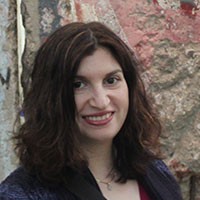
Are you curious about how to create a routine that allows you or your team to reflect on your philanthropic practice? Dara Weinerman Steinberg, Executive Director of Lippman Kanfer Family Foundation, shares her experience wrangling time to reflect and how it has reinvigorated her belief in the value of informal learning from strategy. I appreciated how many times she had to put it on her calendar before she gave reflection its due. It's not easy! Dara and I hope this post will encourage you to experiment with taking time for reflection at work. Put that into your calendar, please! - Jan Jaffe
Like many people, I’ve been moving forward without making adequate time to reflect. I’ve struggled to find the quiet time to think and explore different possibilities as to how the foundation might refine its grantmaking. I’d put a Shultz Hour on my calendar, and invariably I would move it to accomplish a task that was time sensitive. Plus, it’s easier to put off strategic work when there is no clear plan for how to do strategic reflection.
But I was convinced of its importance, so I kept putting those hours on my calendar. One day I said – no more excuses; I’m going to take this hour to work on big-picture strategy. There I was with an hour of uninterrupted time at my desk saying, “Now I’m going to strategize.” And wondering – how do I begin? How do I think big picture and allow my mind to wander, and yet make this time feel productive?
I was inspired by the reflective technique of putting something in the middle. It reminded me of a free writing exercise I had done in creative writing workshops. There, you took a piece of art and used it as the jumping off point to craft a story or poem. What if I took the foundation’s grant portfolio – just the list of grants and amounts (it’s only 25-30 grants) – and used that as my writing prompt?
I gave it a try. I went old school: a piece of lined paper, a pen and a (mostly) clean desk. I printed my “prompt” list of grants and let my screen saver roll on my computer.
For the rest of the hour, I wrote. I employed the principles of free writing and wrote without judgment and without editing. I let my brain wander and glanced periodically at my prompt. I wrote down both mundane and noteworthy observations. I would stare out at space for a few minutes and then glance at the prompt again. It’s easy to fall into the trap of “busyness” and feel like not enough is being accomplished, so I found it easier to think of this as a process and not an endpoint. To keep going, I drew on the Jewish wisdom that “you do not need to complete the task, but you also may not desist from it.” By the end of the hour I had new bits of insight into our portfolio and a set of notes as a starting point for the next time I sat down to reflect. Reflecting helped me capture questions such as: if we are experimenting in our grantmaking, to what extent is the metaphor of the foundation as a “lab” helpful - or not - as we refine our programs? And, if the foundation prides itself in extending non-financial support for grantees, how can we determine which forms of support are most effective for our intended impact and our grantee’s mission?
This short experiment yielded several benefits. It helped prepare for year-end strategy review and refinement by identifying and collecting core questions that we need to answer in that process. Personally, for the next few weeks after taking the time to reflect I had both a heightened sense of understanding and curiosity and a greater sense of confidence. While I didn’t have (or expect) a breakthrough idea for refining the foundation’s current grantmaking approach, surfacing the components of our work enabled me to better draw upon them in our day-to-day questions and interactions with our partners.
Aha moments are few and far between, but sensemaking can happen frequently. This technique was a little like meditation. I got a taste of the curiosity, peace and (paradoxically) the disruption of assumptions that happens from observing and reflecting.
For more information about Reflective Practices, please click here.


